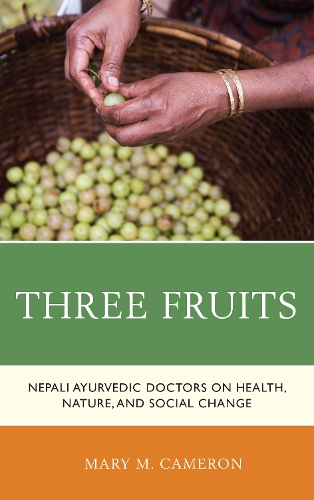
Three Fruits: Nepali Ayurvedic Doctors on Health, Nature, and Social Change
(Hardback)
Publishing Details
Three Fruits: Nepali Ayurvedic Doctors on Health, Nature, and Social Change
By (Author) Mary M. Cameron
Bloomsbury Publishing PLC
Lexington Books
24th April 2019
United States
Classifications
Professional and Scholarly
Non Fiction
615.538
Physical Properties
Hardback
264
Width 161mm, Height 231mm, Spine 25mm
576g
Description
In 1978 Mary Cameron first encountered a medical practice in remote western Nepal that used pulse reading for diagnosis and local plants for medicine. Camerons study of Ayurvedic medical doctors that began two decades later, Three Fruits traces the conceptual and practice lines from those village healers to the professionally trained doctors in the Kathmandu Valley. An intimate portrayal of Ayurvedic doctors in Nepal during a period of political unrest and social change, Three Fruits connects the doctors care for Nepals valued medicinal plants to the boundless joy of health they desire for their patients. Combining ethnography with history and Indian philosophy, the detailed study weaves the elegant theory of tridosa (three humors) and the popular medicine trifala (three fruits) into the narrative accounts of doctors multi-sited practice. Aware of rising global alternative medicine and environmental movements, the doctors speak to their relevance for Ayurveda and sustainable, integrated, and culturally meaningful plural medicine in Nepal.
Reviews
Three Fruits is a magnificent study of Ayurveda as a vibrant intellectual and therapeutic tradition at a critical historical moment. The ethnographic core is a brilliantly crafted depiction of practitioners in their social and political working environments. This sequence of insider views generates a great sensibility towards the system of knowledge about human-environmental vital dependencies in the terms of real characters, whose careers of healing are faithfully brought to life. The book contains furthermore an astute assessment of the contemporary value of ayurvedic knowledge in appreciating the need to protect globally biodiverse ecologies as cultural landscapes, with potential at the same time to contribute towards an equitable, just, and affordable plural public health care system. Three Fruits will multiply the numbers of readers who already know Mary Cameron to be an exceptional observer of social change in Nepal, with a keen activists interest in making a shared tradition find its voice to influence that change for the better. -- Ben Campbell, University of Durham
Three Fruits is a significant contribution to anthropological studies of Ayurveda in South Asia. Drawing on decades of research, Mary Cameron tells a compelling story of how practitioners of traditional healing adapted to a medical system that was predicated on modern medicine pushed by the state. The book is as much about the political economy of Ayurveda as it is about Ayurveda as a cultural system. Told through a series of biographies of ayurvedic practitioners, Camerons narrative illuminates the challenges faced by resource-poor societies in the global south as they strive to reconcile traditional forms of knowledge with their commitment to modernization. -- Arjun Guneratne, Macalester College
Author Bio
Mary M. Cameron is professor of anthropology at Florida Atlantic University.
